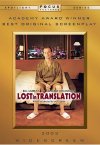BUY THE DVD:
|


|
|
|
SYNOPSIS:
| |
two americans meet and spend a wonderful week in tokyo.
|
|
|
MOVIE FACT:
| |
premiered at the 2003 venice international film festival.
|
|
|
RATING:
|




four out of four possible stars
|
|
|
|
If one were to require proof that actor Bill Murray was a comic genius, taking a look at Lost in Translation would be a good first step. Usually blessed with droll, idiosyncratic roles, Murray has again taken a character and created a personality wholly different from any of his previous cinematic outings. It can probably be said that, excepting only one or two roles, every single one of Murray's performances in recent years have been full of the comedic freshness and enthusiasm missing from most modern comics' repertoire. While a large portion of "Saturday Night Live" alums have engaged in little-to-no real creativity in front of the camera in dozens of feature film bombs (Dirty Work, Down To Earth, Joe Dirt, etc.), Murray has concentrated on well-written comedies whose laugh-per-minute averages have been quite impressive.
Due both to Murray's rather intelligent choices in roles and a knack for taking good writing and making it even better, seeing Murray on the screen in a film makes it all but certain that that film will be funny. And in the case of Lost in Translation, Murray and his co-star, Scarlett Johansson, play roles in what is certainly one of the funniest films of 2003. Not a title to be given lightly, Translation benefits not only from fine lead performances and engaging writing, but also from quite a hilarious group of Japanese supporting actors. While most of the names will be foreign to an American audience (and most audiences outside of Japan, most likely), this film is proof that acting is universal, much in the same way that music is, and that one doesn't necessarily need to know exactly what is being said by the characters in order to enjoy the performances.
None of the Japanese speech in the film is subtitled, but with the highly charged and animated performances of the Japanese actors, no subtitles are needed. In fact, subtitles might have only hampered the story-telling as much of the hilarity in the film comes from Bill Murray's finely honed abilities in physical comedy. It's impossible to stop laughing during a sequence when Murray's character, "Bob Harris," is involved in a photo shoot for an alcoholic drink advertisement. With the Japanese photographer yelling out different American and British film icons (James Bond, for example), Murray attempts to impersonate each of the characters suggested by the photographer. It's just flat-out hilarious.
And though her purpose in the film is not supposed to be a highly comic one, Scarlett Johansson makes an impressive appearance as, "Charlotte," a recent college graduate whose marriage of two years (to "John," played by Giovanni Ribisi as his usually timid self) is somewhat precarious and is causing her sleepless nights. Johansson doesn't allow Murray to upstage her performance and despite the very great age difference between the two actors, it's safe to say that the two have a heartwarming chemistry together that never feels uncomfortable for the viewer. As both of their characters are dealing with what amounts to minor life crises, it's pleasing to see the characters grow fond of one another as they maneuver through such a foreign city.
In that vein, Tokyo itself can probably be considered a third main character, as the city exhibits such a force on the characters. Like the boat in Titanic, the characters progress the way they do because of the influence that Tokyo and its people has upon them. Possessing a culture and architecture so incredibly foreign to Western audiences and tourists, Tokyo is like another planet to many visitors. Existing as a mixture of hyper-reality, intense technological advancement, and traditional Japanese culture, Tokyo is much more than just a culture-shock for foreign visitors and director Coppola had done a fine job in conveying this strange urbanity to the audience.
With a budget of four million dollars, director and writer Sophia Coppola has emerged from her father's shadow as an intelligent and capable filmmaker whose pedigree is not the sole reason for her success with this film. Seemingly more suited for a job behind the camera, Coppola has shown herself to be a talented writer and director and the feature film world has benefited with her time on that side of the lens. 1998's The Virgin Suicides was not a universally praised film, though it was an impressive directorial debut (note that Coppola first directed a 14 minute short entitled, "Lick the Star," in 1998). Lost in Translation is a cinematic achievement for someone who has directed but one other feature length film. Owning to engaging performances, a quirky script, and an intense cinematographic view of Tokyo, this film is a unique entry into what has been a rather lackluster year for the comedy genre.
Review by Kelsey Wyatt.
| |
|